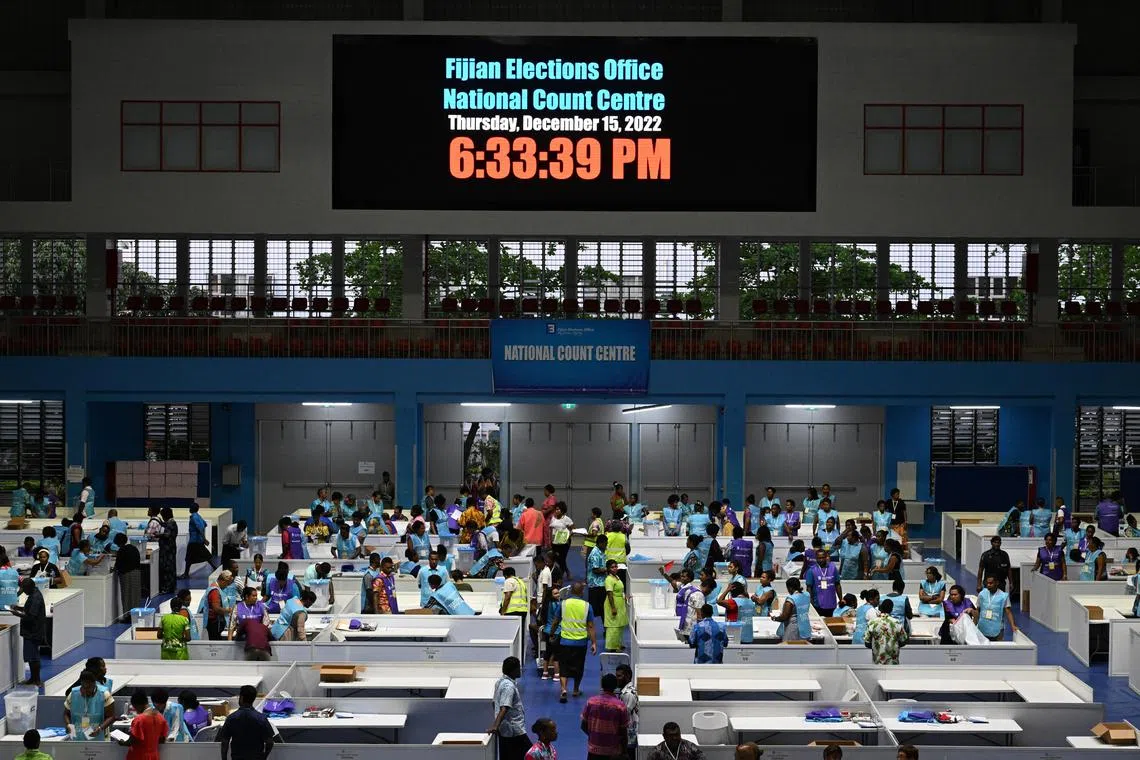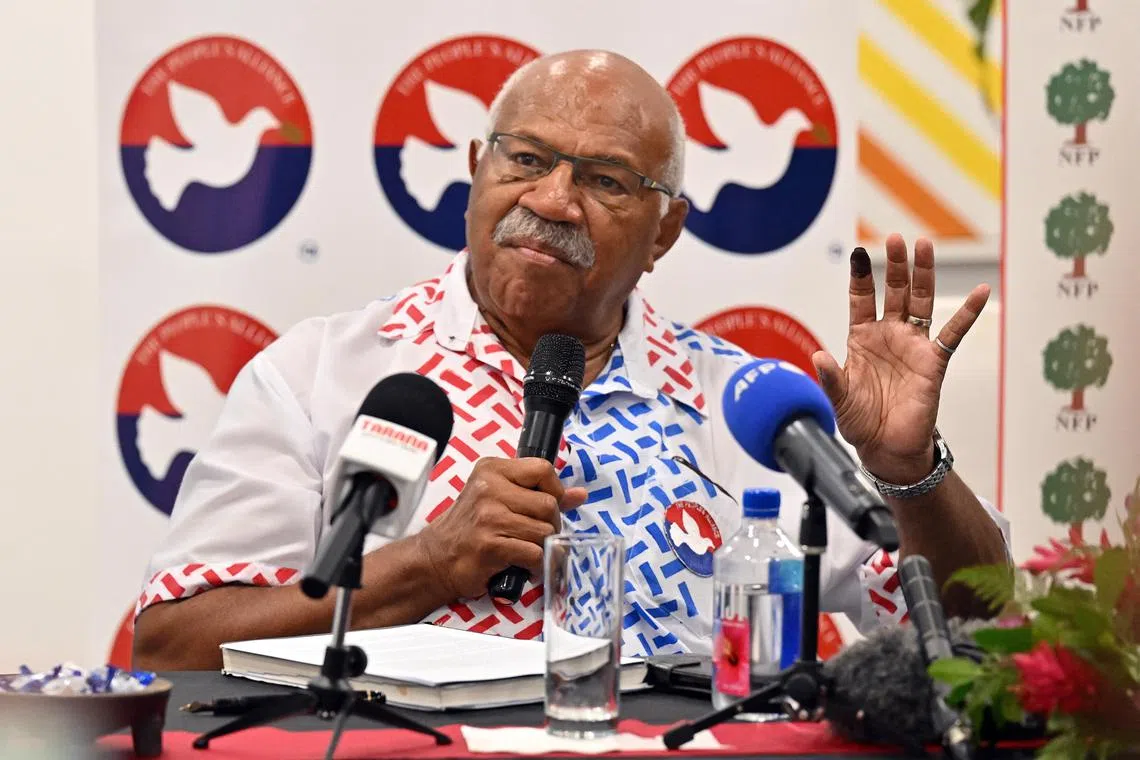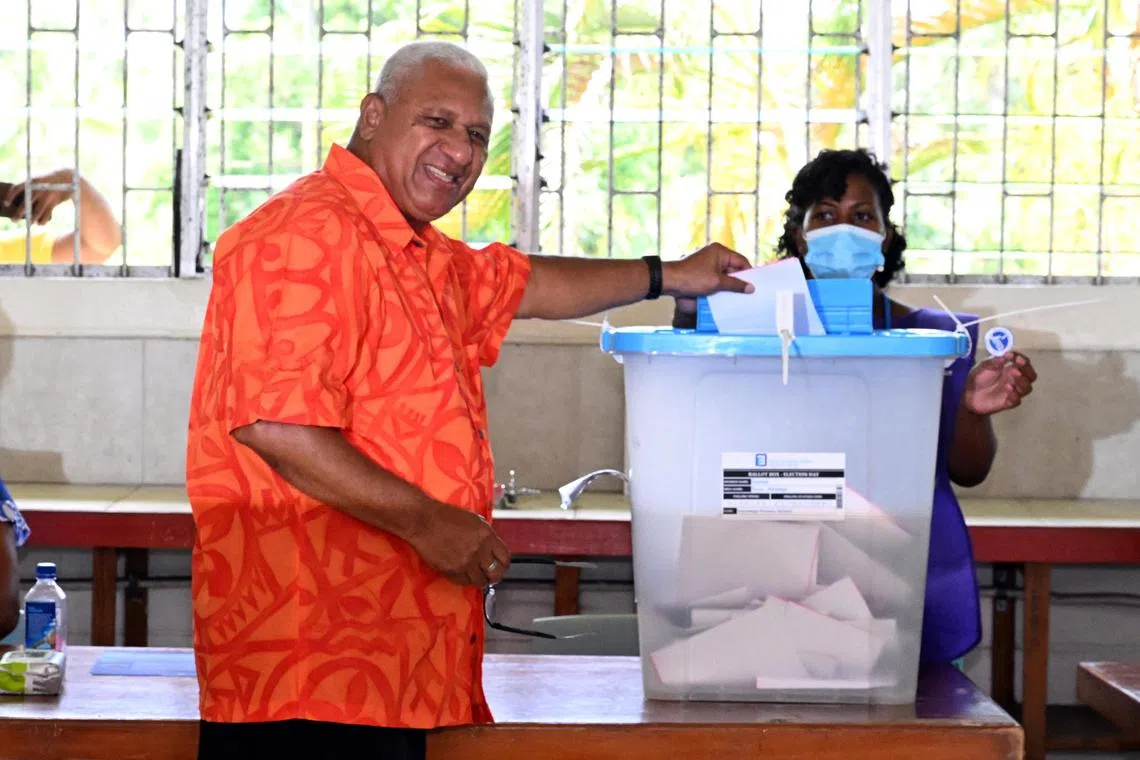Fiji’s strongman leader loses majority in national elections
Sign up now: Get ST's newsletters delivered to your inbox

The cliffhanger result caps a tumultuous campaign marked by allegations of fraud and calls for the military to intervene.
PHOTO: EPA-EFE
SUVA, Fiji – Fiji’s long-time leader Frank Bainimarama failed to win a majority in elections held last week, leaving the Pacific island nation facing a hung Parliament and a period of uncertainty as political parties look to form coalitions.
Mr Bainimarama’s Fiji First Party won 26 seats in the Dec 14 vote, according to Fijilive.com and data from the Fiji Elections Office. That is two short of the majority needed to form a government in the 55-member Parliament.
It typically takes days for final results to come in after the polls because ballots need to arrive from outlying islands.
The People’s Alliance Party led by Mr Sitiveni Rabuka came in second with 21 seats, with the rest taken by other parties, including the Social Democratic Liberal Party, or Sodelpa, which won three.
The result caps a tumultuous campaign marked by allegations of fraud and calls for the military to intervene.
The government will now be formed through what could be a drawn-out negotiation process, with both sides already courting Sodelpa, which holds three seats and the balance of power.
It has been a tumultuous few days in the South Pacific archipelago nation.
After polls closed on Wednesday, opposition leader Mr Rabuka claimed “anomalies” in the count and asked the country’s powerful military to step in. He was then hauled in for questioning by detectives.
On his release, he told AFP it was part of a government effort to intimidate him.
“The way this government has operated, we’ve been talking about a climate of fear. This is how they instil that fear,” he said.
Deeply Christian Fijian businessman Viliame Gavoka and his Social Democratic party look set to play kingmaker, and negotiations with both major parties are already under way.
A Social Democratic official said the party was locked in discussions with the Fiji First party when AFP visited the campaign headquarters on Sunday morning.
Mr Rabuka’s People’s Alliance kicked off negotiations late on Saturday night – a major sticking point being whether Mr Rabuka would serve as prime minister.
Mr Gavoka has fallen out with Mr Bainimarama in the past, but has a particularly tense relationship with Mr Rabuka, who he replaced as leader of the Social Democrats.
The vote holds regional significance – Mr Bainimarama has been close to Beijing, while both Mr Rabuka and Mr Gavoka have signalled their desires to loosen Fiji’s ties with China.
Fiji has been upended by four coups in the past 35 years, and many on the streets of its capital, Suva, had hoped in vain for a smooth election.
The trouble started early on Thursday morning, when what the election officials called a technical “anomaly” knocked results offline for four hours.
By Friday, six opposition leaders including Mr Gavoka were calling for counting to be stopped pending an independent “forensic audit”.
Mr Rabuka, a two-time coup leader and former Commonwealth Games shotputter nicknamed “Rambo”, was then called in for police questioning late on Friday night.

People’s Alliance Party leader Sitiveni Rabuka speaks during a press conference in Suva, Fiji, on Dec 17, 2022.
PHOTO: EPA-EFE
Military commander Jone Kalouniwai rebuffed Mr Rabuka’s plea.
Fiji Labour Party leader Mahendra Chaudhry – a former prime minister ousted in a coup – on Saturday repeated claims that the election had been undermined by voter fraud.
Election supervisor Mohammed Saneem hit back, saying Mr Chaudhry had provided no evidence.
“Mr Chaudhry has made a grand claim about voter fraud,” he told reporters at the national vote centre.
“This is serious ladies and gentlemen. Step up with the evidence.”

Fiji’s Prime Minister and FijiFirst leader Frank Bainimarama votes at the Yat Sen Secondary School polling station on Dec 14.
PHOTO: EPA-EFE
Incumbent Bainimarama seized power 16 years ago in a putsch.
He legitimised his government through election wins in 2014 and 2018 – but his majority has shrunk each time.
Fiji spans more than 300 tropical islands but has a population of just shy of one million people.
Still, it is one of the South Pacific’s major players and a powerful voice in the global debate on climate change.
Already threatened by rising sea levels, Fiji was the first country to ratify the Paris climate agreement in 2016. AFP, BLOOMBERG


